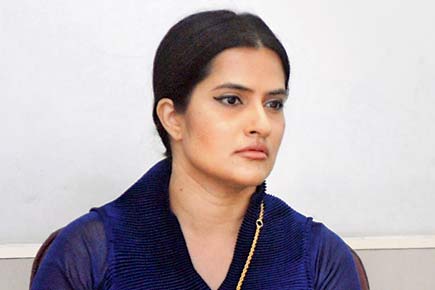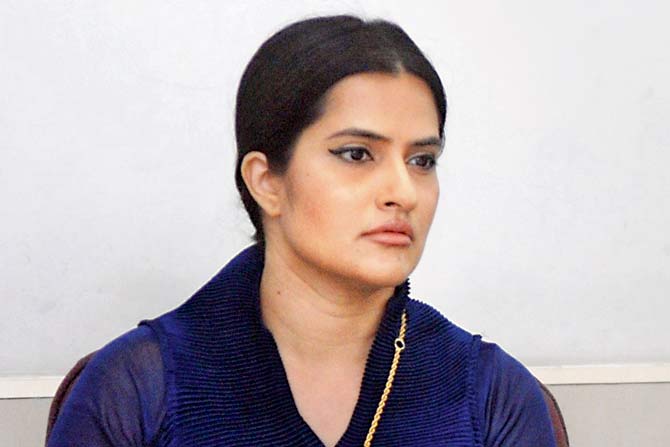Recently singer Sona Mohapatra, along with India’s Raw Star Rituraj Mohanty, performed the iconic Sambalpuri song Rangabati on MTV Coke Studio. The song, beloved in Orissa, got over a million hits online.

Sona Mohapatra
 Recently singer Sona Mohapatra, along with India’s Raw Star Rituraj Mohanty, performed the iconic Sambalpuri song Rangabati on MTV Coke Studio. The song, beloved in Orissa, got over a million hits online.
Recently singer Sona Mohapatra, along with India’s Raw Star Rituraj Mohanty, performed the iconic Sambalpuri song Rangabati on MTV Coke Studio. The song, beloved in Orissa, got over a million hits online.
ADVERTISEMENT
It also attracted a lawsuit. The copyright holders of the song — lyricist Mitrabhanu Gauntia and music director Prabhudutta Pradhan — had not been asked for permission or credited on the show. Though they demanded one crore rupees, they claimed their reasons for the lawsuit were emotional — the song had been “distorted” and “hurt sentiments.”

Sona Mohapatra
Ms Mohapatra, responding on Twitter, elided legal issues and said the lawsuit was politically motivated. In a subsequent interview, she added her intention had been to “put a spotlight on” her home state. The song had “united Odias”, an intent and effect one might reasonably call political.
It’s possible there’s an assumption or feeling that such popular songs belong to everyone, especially given their folk roots. So it never struck anyone in the crushing Intellectual Property Rights heavy-world of corporate entertainment to clarify copyright issues. It would be interesting to see what happens if Coke Studio’s Rangabati were used somewhere without permission. Hai na?
Some weeks earlier, Bandra’s favourite hipster songstress started a crowd-funding campaign to raise R50 lakh for a music video called Shiver intended to “strike at the heart of Article 377” and help the LGBT community. Before you could say Monica Dogra, she attracted scorn and some righteous anger online for capitalising on the sexual rights movements for personal aggrandisement.
One could fairly question Ms Dogra’s claim that an arty sounding video would ‘mainstream transgender representation in popular culture.’ But can one question her right to make this claim, the video and in fact, claim these politics? Like folk songs, don’t issues belong to everyone?
So, what is the restlessness ‘negativity’ that these stories elicit really about?
The Intellectual Property Rights (IRP) structure of corporate entertainment is not built to favour artists or recognise how a common pool of culture contributes to all artistic expression. It believes in exclusive ownership and big numbers and criminalises ideas based on sharing. Some feel this has contributed to the loss of diverse musical cultures. Arguably, unlike its Pakistani counterpart, Coke Studio India, while claiming to celebrate folk hasn’t made too many great folk artists famous, as much as further privileged commercially successful artists via folk music.
Similarly, hipster culture claims to be anti-mainstream. This is often more an aesthetic lifestyle choice than a political one. Political ideas, expressed in generic terms of peace and love, generate coolness and brand identities removed from the complicatedness and difficulties of actual political struggles and affected communities, but with some pretty mainstream profits for individual brands.
When people speak of political ideas without acknowledging the political realities, inherent in the structures they’re part of, the disconnect may be read as hypocrisy, despite their good intentions. Judging them personally, may be mean minded. But they too might need to understand a little differently, the anger and resentment of those whose worlds they chance to replace.
These two stories are about one question. Why do even successful artists feel they must prove their art’s value through supposed political worth, instead of letting it acquire that political meaning organically?
It’s because art itself is devalued today. It must constantly justify its existence via numbers, money or worthiness. The more we give in to this logic, the more it threatens the world of art and artists. The artist’s political fight may need to be for art itself; for structures that recognise that art, which expands our minds and unburdens our hearts is culturally valuable and socially necessary for those very reasons, not others.
Paromita Vohra is an award-winning Mumbai-based filmmaker, writer and curator working with fiction and non-fiction. Reach her at www.parodevi.com.
The views expressed in this column are the individual’s and don’t represent those of the paper.
 Subscribe today by clicking the link and stay updated with the latest news!" Click here!
Subscribe today by clicking the link and stay updated with the latest news!" Click here!







